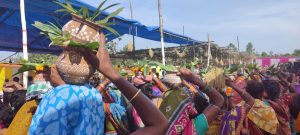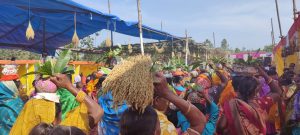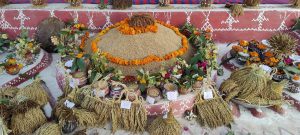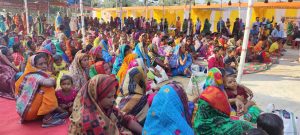

Lalita Naik from Champadali village has been using local seeds of millet and rice for cultivation and promoting it among villagers. “We mostly cultivate indigenous varieties of rice, millet, and local vegetables in our land. We cultivate following traditional methods and don’t use chemical fertilizers as it is not good for health,” shared Lalita.
A few years back, Lalita and her husband were using hybrid varieties of rice but then they stopped using it. “We completely stopped farming the local seeds and were using hybrid seeds to get more production. However, we learned about the harmful impact of these seeds on our health and soil, so we switched to local seeds,” she informed.
Lalita and her husband don’t use chemical fertilizers. “We only use cow dung manures. We get enough to produce to sell after keeping aside a portion for our consumption,” she added.
Stating that Odisha used to have 36000 varieties of indigenous seeds, Sisir Parija, Organic Agriculture Expert said, “Local seeds have low production so the government introduced high-yielding seeds across the country. However, it was not the right decision. As most farmers are now using hybrid seeds, many indigenous seeds have vanished. Our future generations won’t be able to know about the various varieties of rice we used to have.”
Emphasising the use of local seeds, he said, “Organic farming using indigenous seeds is the best way. It is not dependent on chemical fertilizers like hybrid seeds which is unhealthy. We should promote the use of local seeds among farmers to improve food quality. Moreover, local seeds can also give large production if done properly.”
Speaking about the importance of indigenous seeds and ecological farming, Prasant Mohanty, Executive Director, NIRMAN said, “Indigenous seeds are good for our health, soil and climate. We need to act fast and conserve our local varieties of rice, millet, pulses, and vegetables among others.”
“Instead of traditional farming and organic farming, we can go for ecological farming practices. Organic farming focuses only on organic inputs like organic manure and pesticides which farmers have been practicing in the traditional way of farming as well,” he shared.
Sharing about what NIRMAN is doing, he said, “We are trying to facilitate farmers to adopt ecological farming where they can produce their own indigenous improved seeds and conserve them. We also facilitate farmers to practice SRI, SMI, line sowing, mixed farming, nutrition garden.”
On the concluding day of the festival exhibited indigenous seeds of paddy, millets and pulses were exchanged among the farmers.
“For high production we cultivate high yielding seeds, but in a small patch of land we do cultivate our indigenous seeds for our consumption,” shared farmer Mahendra Behera from Raisara village, Dasapalla.
He took a millet variety in the seed exchange. “Such seed exchange event is good as it would help us to get different varieties of seeds from other farmers,” he shared.

Comments are closed.